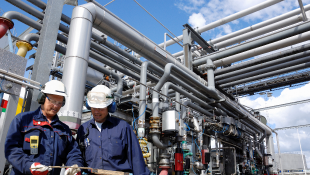
High upfront investments would be offset by lower energy costs.
It’s going to take $2.5 trillion in spending over the next decade to get the U.S. on a path to a carbon-free economy, but the transition will help to pay for itself, Princeton University researchers say.
Achieving net-zero emissions by 2050 -- a central goal of President-elect Joe Biden’s climate plan -- would require expanding renewable-energy systems, building more efficient homes and putting 50 million electric cars on the road, according to a report released Tuesday.
The effort, two years in the making, is the first major assessment since the election detailing how the U.S. can transition to an energy system that satisfies scientific guidance for keeping the climate livable. While the upfront costs are significant, they would be offset by savings associated with switching to cheaper electricity and the creation of as many as 1 million new jobs, according to the researchers, who shared an earlier draft with Biden’s transition team.




